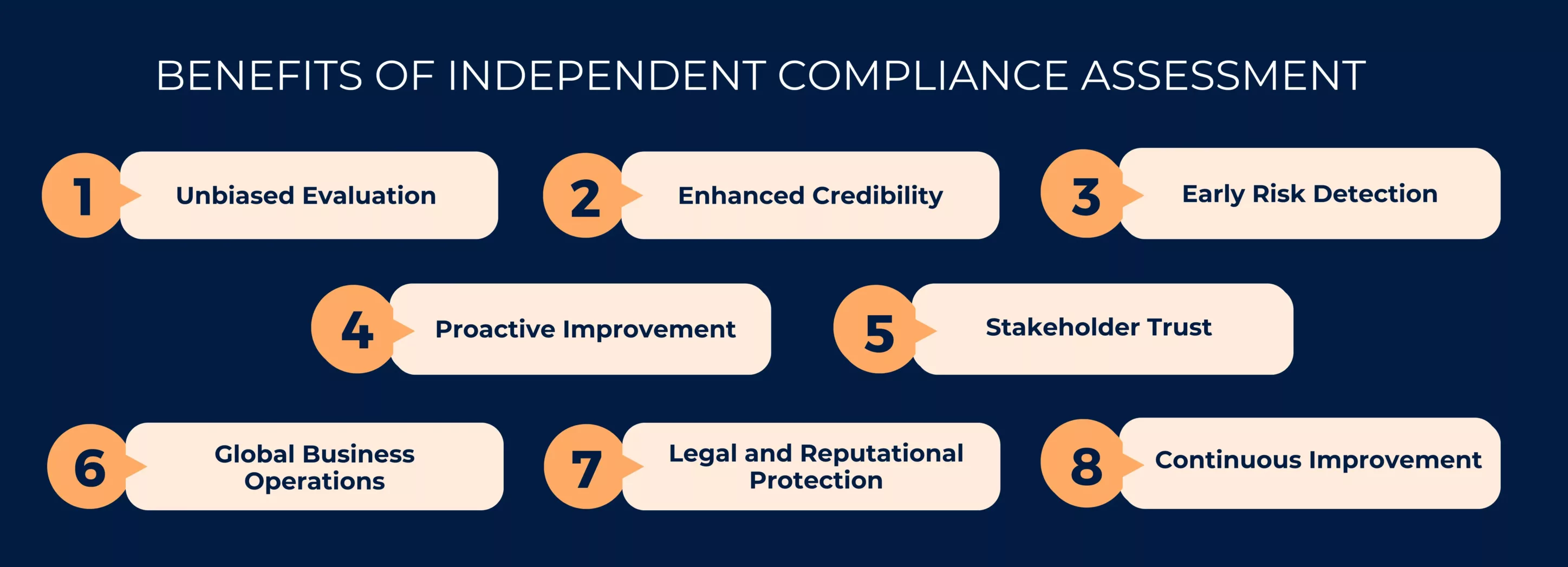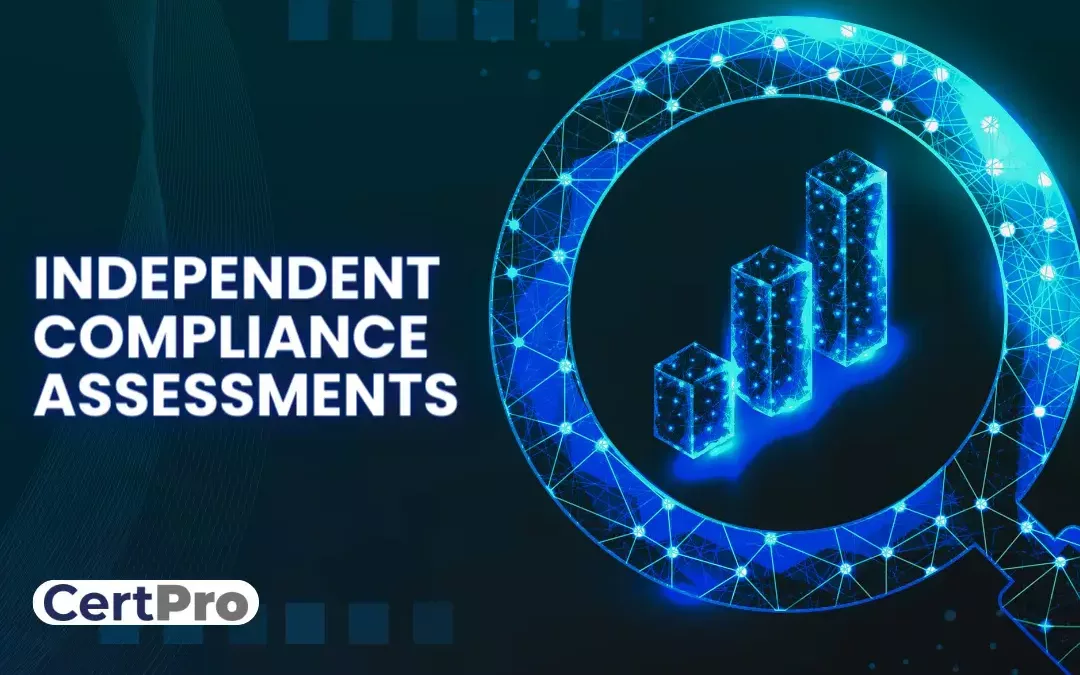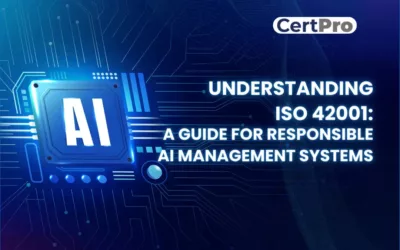In an era defined by intricate regulatory frameworks, ethical imperatives, and a heightened emphasis on transparency, compliance assessments have emerged as a cornerstone of responsible corporate conduct. These assessments, often conducted by impartial external entities, scrutinize an organization’s practices, protocols, and policies to ensure they align with legal mandates, industry standards, and internal guidelines.
The essence of independent compliance lies in its objective evaluation of an organization’s adherence to diverse regulations and ethical principles. Unlike internal reviews, third parties conduct these assessments devoid of inherent organizational biases, ensuring an unbiased and rigorous analysis. The scope of such assessments encompasses a thorough examination of processes, documentation, and operational realities to identify potential compliance gaps or deviations.
Beyond the realm of legality, it plays a pivotal role in fostering stakeholder trust. They provide credible validation of an organization’s commitment to ethical business practices, enhancing its reputation and market credibility. By unearthing compliance deficiencies early on, these assessments enable timely corrective actions, mitigating legal risks and potential reputational damage.
This article delves deeper into the multifaceted landscape of compliance assessments, exploring their significance, benefits, and broader implications in shaping modern businesses as responsible, accountable, and ethical entities.
WHAT ARE INDEPENDENT COMPLIANCE ASSESSMENTS?
External experts conduct thorough and objective evaluations known as Independent Compliance Assessments to assess an organization’s adherence to relevant regulations, industry standards, and internal policies. These assessments are designed to ensure that organizations operate within legal and ethical boundaries while minimizing risks. It possesses a key feature: their unbiased nature stems from third-party entities performing them, entities that maintain no direct involvement in the organization’s day-to-day operations.
During this, external assessors review documents, conduct interviews, and potentially visit operational sites to verify compliance practices. They identify areas of non-compliance, gaps, and potential risks. The goal is to provide an impartial evaluation of the organization’s compliance efforts, offering insights into its strengths and areas for improvement.
These assessments are valuable for several reasons. They enhance transparency and accountability by subjecting organizations to external scrutiny. Positive assessment outcomes bolster an organization’s credibility and reputation with stakeholders, such as customers, investors, and regulatory bodies. By identifying compliance gaps and risks early on, organizations can take corrective actions to avoid legal liabilities, financial losses, and reputational harm.
It plays a pivotal role in maintaining the integrity of various industries and ensuring that organizations meet their legal and ethical obligations. They contribute to building stakeholder trust, promoting consistent compliance practices, and supporting a culture of responsibility within organizations.
BENEFITS OF INDEPENDENT COMPLIANCE ASSESSMENT
It offers a range of substantial benefits that contribute to an organization’s overall integrity, accountability, and risk management. These assessments, conducted by external experts, provide an impartial evaluation of an organization’s adherence to regulations, industry standards, and internal policies.
Some key benefits are:
1. Unbiased Evaluation: One of the primary advantages of this is its impartiality. External entities without vested interests in the organization conduct these assessments, providing an objective and unbiased view of the organization’s compliance efforts.
2. Enhanced Credibility: Positive outcomes from compliance program assessment enhance an organization’s credibility and reputation. Regular assessments show commitment to transparency and ethics, enhancing trust and engagement from stakeholders: customers, investors, and regulators.
3. Early Risk Detection: It helps identify compliance gaps and potential risks early on. By pinpointing areas of non-compliance or weaknesses in processes, organizations can take proactive measures to address these issues before they escalate into significant problems.
4. Proactive Improvement: These assessments provide valuable insights into areas requiring improvement, helping organizations enhance their internal processes and practices.
5. Stakeholder Trust: Industries handling sensitive information, such as healthcare and finance, benefit from compliance. These assessments build trust among stakeholders by assuring them that their data is handled ethically and in accordance with regulations.
6. Global Business Operations: Organizations operating across different jurisdictions face the challenge of navigating diverse regulatory frameworks. It aids in ensuring adherence to local and international standards, enabling smooth cross-border operations, and preventing legal complications.
7. Legal and Reputational Protection: It shields organizations from potential legal penalties and reputational harm resulting from non-compliance.
8. Continuous Improvement: It serves as a catalyst for continuous improvement. Organizations can use assessment findings to refine their compliance strategies, adapt to evolving regulations, and stay ahead of emerging risks.
In conclusion, these are invaluable tools that empower organizations to uphold ethical practices, maintain regulatory compliance, and manage risks effectively.

CHALLENGES OF INDEPENDENT COMPLIANCE ASSESSMENTS
Conducting assessments of compliance brings numerous benefits, but it’s not without its challenges. These assessments, carried out by external experts, face several hurdles that organizations must address to ensure their effectiveness and reliability.
Some significant challenges associated with compliance assessments include:
Cost: It can be resource-intensive, involving the engagement of external experts, data collection, analysis, and report generation. The financial burden of these assessments might be considerable, especially for smaller organizations with limited budgets.
Expertise and Qualifications: Selecting qualified and experienced external assessors is essential for a credible assessment. Finding professionals with in-depth knowledge of diverse regulations and industry standards can be challenging, and ensuring their impartiality is equally important.
Scope and Focus: Determining the scope of the assessment and the specific compliance areas to be evaluated requires careful consideration. The assessment should cover the relevant regulations and standards without becoming overly burdensome or unfocused.
Organizational Complexity: Large organizations with intricate structures and multiple operational units can pose challenges for assessments. Coordinating and aligning efforts across various departments and sites can be time-consuming and complex.
Data Privacy and Security: Sharing sensitive operational data with external assessors can raise concerns about data privacy and security. Organizations need to ensure that assessors handle confidential information appropriately and adhere to data protection regulations.
Organizational Resistance: Employees and stakeholders might perceive independent assessments as intrusive or disruptive to business operations. Overcoming resistance and communicating the benefits of assessments is crucial to ensuring cooperation throughout the process.
Dynamic Regulatory Environment: Regulations and standards evolve over time, requiring organizations to keep up-to-date with changes that might impact their compliance efforts.
In conclusion, it offers valuable insights and advantages, but organizations must navigate several challenges to ensure their success.
NAVIGATING COMPLIANCE FOR RESPONSIBLE EXCELLENCE
The role of compliance program assessments shines brightly. Impartial external entities conduct these evaluations to ensure organizational adherence to legal mandates, industry benchmarks, and internal principles.
It holds a two fold promise objective scrutiny and stakeholder trust. Their unbiased nature lends credibility to an organization’s commitment to ethical practices, thereby enhancing its reputation. Timely identification of compliance gaps further safeguards against legal risks and reputational harm.
As organizations embrace the opportunities presented by independent assessments, challenges like costs and expertise must be navigated. Striking this balance propels businesses towards ethical accountability, shaping a future where compliance is not just a requirement but a cornerstone of responsible and sustainable success.
FAQ
WHY IS COMPLIANCE ASSESSMENT IMPORTANT?
It enhances transparency, accountability, and stakeholder trust. They provide credible validation of an organization’s commitment to ethical business practices, identify compliance deficiencies early on, and enable timely corrective actions to mitigate legal risks and reputational damage.
WHAT BENEFITS DO ORGANIZATIONS GAIN FROM INDEPENDENT ASSESSMENTS?
Some key benefits include unbiased evaluation, enhanced credibility, early risk detection, proactive improvement, stakeholder trust, support for global operations, legal and reputational protection, and continuous improvement of compliance strategies.
WHAT CHALLENGES ARE ASSOCIATED WITH INDEPENDENT ASSESSMENTS?
Challenges include the cost of assessments, finding qualified assessors, determining scope and focus, addressing organizational complexity, ensuring data privacy and security, overcoming resistance from employees and stakeholders, and keeping up with the dynamic regulatory environment.
HOW CAN ORGANIZATIONS ADDRESS THE CHALLENGES OF INDEPENDENT ASSESSMENTS ?
Organizations can address challenges by carefully budgeting for assessments, selecting qualified assessors, defining clear assessment scopes, streamlining processes for complex organizations, ensuring data privacy compliance, effectively communicating the benefits of assessments, and staying updated with regulatory changes.
HOW DO INDEPENDENT ASSESSMENTS SHAPE THE FUTURE OF BUSINESSES?
It helps organizations uphold ethical practices, maintain regulatory compliance, and manage risks effectively. By addressing challenges and striking a balance, businesses can make compliance a cornerstone of responsible and sustainable success.

About the Author
RAGHURAM S
Raghuram S, Regional Manager in the United Kingdom, is a technical consulting expert with a focus on compliance and auditing. His profound understanding of technical landscapes contributes to innovative solutions that meet international standards.
HOW DOES THE NIST CYBERSECURITY FRAMEWORK FUNCTION, AND WHY IS IT IMPORTANT?
Emerging cyber threats make cybersecurity an essential consideration for organizations handling and managing data. In this regard, the NIST cybersecurity framework applies to improving your cybersecurity program. It is a set of guidelines that helps improve your...
UNDERSTANDING ISO 42001: A GUIDE FOR RESPONSIBLE AI MANAGEMENT SYSTEMS
The invention of artificial intelligence (AI) has changed the operational processes of many industries. However, the rapid growth of technology increases ethical, security, and privacy-related concerns. Therefore, the International Organization for Standardization...
EUROPEAN UNION’S ARTIFICIAL INTELLIGENCE ACT: HOW THIS GROUNDBREAKING LAW AFFECTS YOUR BUSINESS
Nowadays, Artificial Intelligence (AI) is transforming our lives exceptionally well. AI is now streamlining healthcare services, providing virtual assistance, and fulfilling queries. Technologies have boons and curses. Similarly, AI creates many concerns about...




